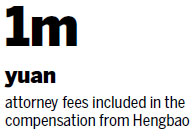

In a patent ruling made by the Beijing Intellectual Property Court last week, the defendant was ordered to pay a total of 50 million yuan ($7.2 million) in damages to the patent rights owner, the highest amount since the court was founded in November 2014.
It is also the first ruling in which the court clarified how the attorney fees were charged.
Both the plaintiff, Watchdata Co Ltd, and the defendant, Hengbao Co Ltd, are manufacturers of USB keys used as electronic authentication devices in financial services.
Watchdata filed the lawsuit in February 2015. It said that Hengbao had developed and sold many USB key products to "scores of banks across China", using its patent called "physic identification method and electronic device" without its authorization.
It requested the defendant cease its infringement and asked for compensation of 49 million yuan, plus 1 million yuan in litigation costs.
Hengbao claimed that the questioned products and physic identification method in online bank transfers were not under the protection of Watchdata's patent.
The court organized a collegial panel of judges and assessors, which ruled in favor of the plaintiff. The judicial committee decided to calculate the compensation by multiplying the sales volume of the infringing products by the reasonable profit of each patented product.
Investigations found the specific sales volume of the infringing products to 12 banks nationwide, which led to actual damages of about 48.1 million yuan.

The court also confirmed that Hengbao had provided infringing products to another three banks, but was unable to acquire sales data from the banks or the company.
"Hengbao refused to hand in related data because it might lead to consequences against its interests," said He Xuan, the presiding judge of the case, in an interview with China Central Television.
Based on common practices, the court presumed that the illegal profit from selling the devices to the three banks was at least 2 million yuan.
The court also supported the demand of the litigation cost, commonly known as attorney fees, considering the necessity of hiring agents, the difficulty of the case and the actual contribution of the lawyers.
For the first time, the Beijing Intellectual Property Court recognized the above three factors as the principles to judge attorney fees.
Chen Jinchuan, deputy director of the court, said they have been enhancing IP protection by greatly increasing compensation from rights violators, especially those committing bad faith and repetitive violations, so that the cost of IP infringement will no longer be low.
"The market is the best frame of reference to determine the value of IPs," he said.
zhangzhao@chinadaily.com.cn